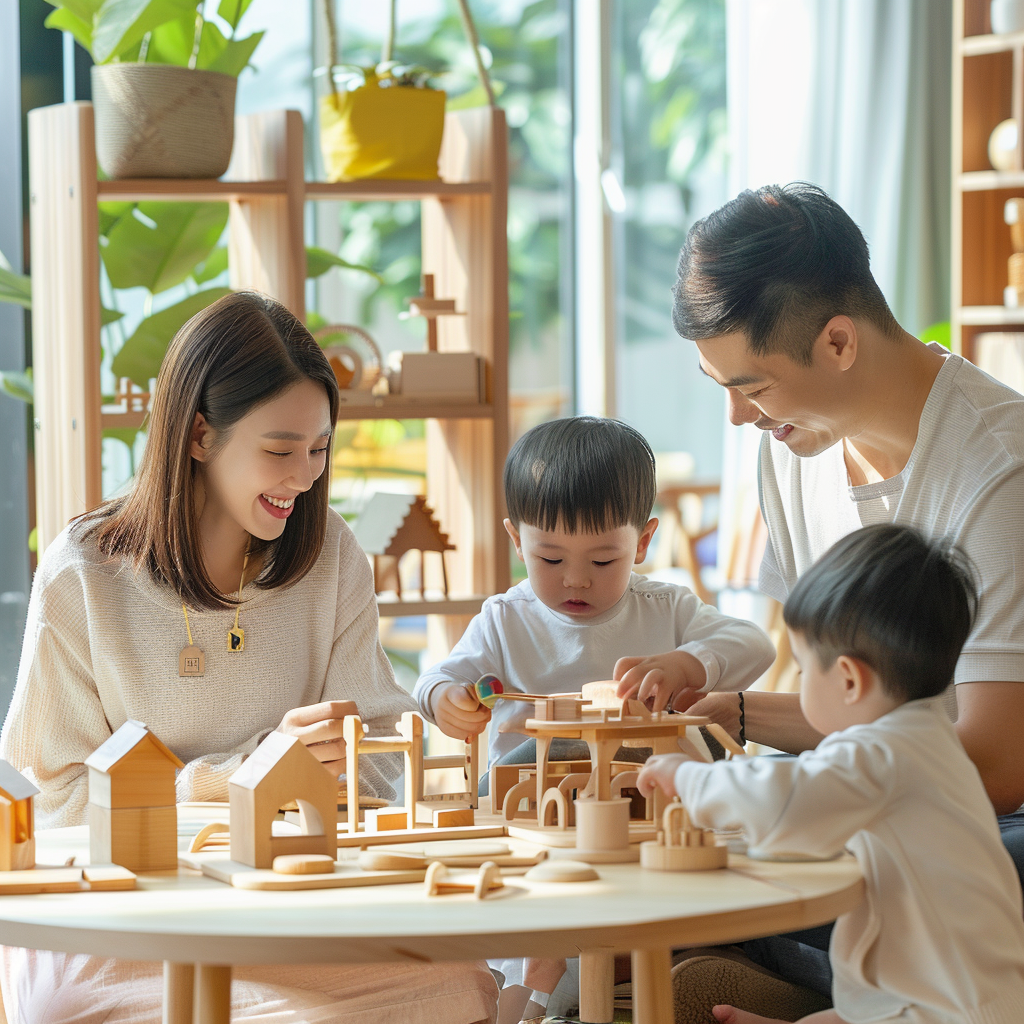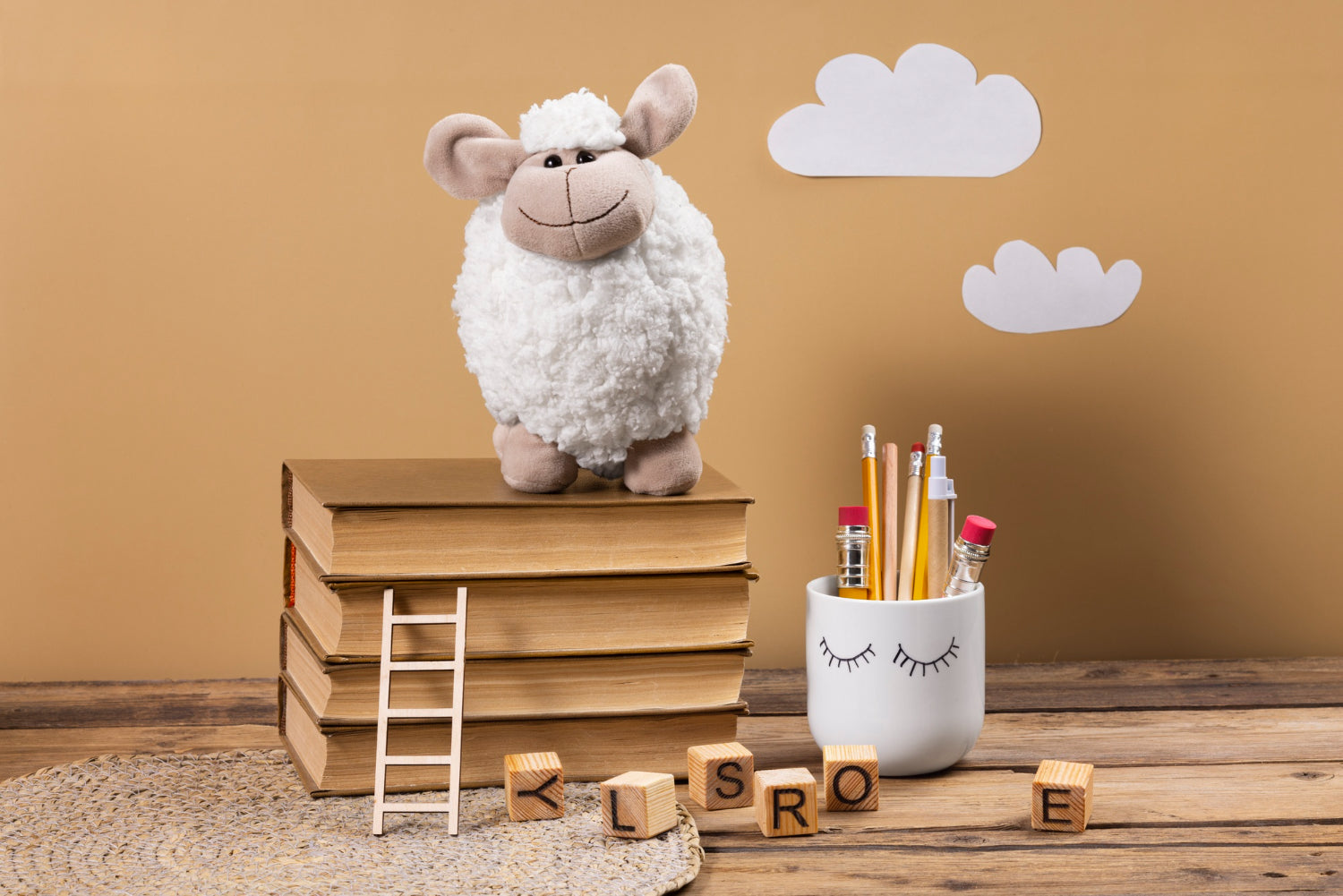This comprehensive guide provides parents with practical strategies for fostering independence and lifelong learning within the home environment, following the principles of Montessori at home. From creating a nurturing atmosphere to encouraging self-directed exploration, parents can seamlessly integrate Montessori philosophy into their daily routines, empowering their children to thrive in the comfort of their own home.
Introduction

The Montessori educational philosophy, developed by Dr. Maria Montessori in the early 20th century, is widely recognized for its innovative approach to child development and learning. Based on principles of autonomy, self-direction, and hands-on exploration, Montessori education has gained prominence in schools worldwide. However, the application of Montessori principles is not limited to formal educational settings. Extending these principles to the home environment can profoundly impact a child's development and overall well-being.
Overview of the Montessori Education Philosophy
At the heart of the Montessori philosophy lies the belief in the child's innate capacity for self-directed learning and exploration. Dr. Montessori emphasized the importance of creating environments that support children's natural curiosity and desire to learn. Central to her approach is the concept of the prepared environment, which is carefully designed to facilitate independent exploration and discovery.
Importance of Extending Montessori Principles to the Home Environment
While Montessori schools provide an ideal environment for implementing Montessori principles, the home environment plays a crucial role in a child's overall development. Children spend a significant amount of time at home, making it an essential setting for fostering independence, curiosity, and a love of learning. By integrating Montessori principles into daily routines and activities at home, parents can create an environment that nurtures their child's growth and development.
Objectives and Structure of the Article
In this article, we aim to explore the significance of incorporating Montessori principles into the home environment and provide practical strategies for parents to do so. We will begin by examining the core principles of Montessori education and their relevance to the home setting. We will then discuss the importance of creating a prepared environment at home and fostering independence and self-directed learning in children. Additionally, we will explore ways to integrate Montessori principles into daily routines and activities, as well as strategies for overcoming challenges and adapting to individual needs. Through this comprehensive exploration, we hope to empower parents to create nurturing and supportive home environments that promote their child's overall development and well-being.
Understanding the Montessori Education Philosophy

The Montessori educational philosophy, developed by Dr. Maria Montessori in the early 20th century, is grounded in a set of core principles that prioritize the holistic development of the child. In this section, we will delve deeper into these principles, explore Dr. Montessori's pedagogical approach, and examine the role of the home environment in supporting Montessori principles.
Explanation of the Core Principles of Montessori Education
Montessori education is founded on several fundamental principles that guide the design of learning environments and educational practices. At the core of Montessori philosophy is the belief in the child's innate capacity for growth and development. Autonomy, or the freedom to choose one's activities and pursue interests, is a central tenet of Montessori education. Through self-regulation and environmental adaptation, children learn to navigate their surroundings independently, developing essential skills for lifelong learning. Individualized learning, tailored to each child's unique needs and interests, is another key aspect of Montessori education. By fostering natural curiosity and a love of learning, Montessori principles aim to cultivate a lifelong passion for exploration and discovery.
Maria Montessori's Universal Pedagogical Approach
Dr. Maria Montessori's pedagogical approach is characterized by a deep respect for the child as an individual and a belief in the importance of creating environments that support their natural development. Her methods are rooted in scientific observation and experimentation, informed by insights from psychology, anthropology, and neuroscience. Dr. Montessori's universal approach to education emphasizes the interconnectedness of all aspects of child development, including cognitive, social, emotional, and physical domains. Her holistic view of education recognizes the importance of nurturing the whole child and empowering them to reach their full potential.
The Role of the Home Environment in Supporting Montessori Principles
While Montessori schools provide an ideal environment for implementing Montessori principles, the home environment also plays a crucial role in supporting children's development. Parents can create a prepared environment at home by providing child-sized furniture, open spaces for movement, and a variety of hands-on materials. By fostering independence and self-regulated learning, parents can empower their children to take ownership of their education and explore their interests at their own pace. Additionally, parents can support Montessori principles by modeling respect, curiosity, and a love of learning in their daily interactions with their children.
Creating a Prepared Environment at Home

The home environment plays a pivotal role in a child's development, serving as the primary context for learning, exploration, and growth. In this section, we will explore the importance of creating a well-prepared environment at home to support children's development and provide practical strategies for implementation.
Importance of a Well-Organized and Child-Friendly Home Environment
A well-organized and child-friendly home environment is essential for fostering independence, creativity, and self-directed learning in children. By creating a space that is tailored to their needs and interests, parents can empower children to explore their surroundings safely and confidently. A clutter-free and organized environment promotes focus and concentration, while child-friendly design elements encourage autonomy and exploration.
Incorporating Child-Sized Furniture, Accessible Materials, and Open Spaces
One key aspect of a prepared environment at home is the inclusion of child-sized furniture, accessible materials, and open spaces for movement and exploration. Child-sized furniture allows children to comfortably engage in activities such as reading, drawing, and play, promoting independence and autonomy. Accessible materials, such as toys, art supplies, and educational resources, should be within reach and organized in a way that encourages exploration and discovery. Open spaces for movement and play allow children to engage in physical activity and develop gross motor skills while also promoting creativity and imagination.
Setting Up Specific Areas for Montessori at Home Activities
Creating designated areas within the home for various activities is another important aspect of a prepared environment. These areas can be tailored to support specific aspects of child development, such as practical life skills, sensorial exploration, language development, and mathematical concepts. For example, a practical life skills area may include activities such as pouring, sorting, and washing dishes, while a sensorial exploration area may include materials for exploring textures, colors, and shapes. Language and mathematical concepts can be supported through activities such as storytelling, counting games, and puzzles.
Encouraging Independence and Self-Directed Learning

Encouraging independence and self-directed learning is fundamental to the Montessori philosophy and plays a critical role in fostering children's development and growth. In this section, we will explore strategies for promoting autonomy, self-directed learning, and goal-setting in children.
Fostering Autonomy by Allowing Children to Make Choices
Autonomy is a key principle of the Montessori at home philosophy, emphasizing the importance of allowing children to make choices and take responsibility for their actions. By empowering children to make decisions about their activities, learning materials, and daily routines, parents can support their development of independence and self-confidence. Providing opportunities for children to make choices encourages them to explore their interests, develop decision-making skills, and take ownership of their learning journey.
Providing Opportunities for Self-Directed Learning
Self-directed learning is central to the Montessori approach, enabling children to follow their interests and learn at their own pace. Hands-on experiences and exploration play a crucial role in self-directed learning, allowing children to engage with materials, experiment, and discover new concepts independently. Parents can support self-directed learning by providing a rich and stimulating environment filled with open-ended materials and activities that encourage exploration and discovery. By fostering a love of learning and curiosity, parents can empower children to take initiative and pursue their interests with enthusiasm and passion.
Supporting Children in Setting and Achieving Their Own Learning Goals
Setting and achieving learning goals is an essential aspect of self-directed learning and helps children develop essential skills such as perseverance, resilience, and problem-solving. Parents can support children in setting realistic and achievable learning goals by encouraging them to identify areas of interest, establish objectives, and create action plans. By providing guidance, encouragement, and feedback, parents can help children stay focused and motivated as they work towards their goals. Celebrating their achievements and milestones along the way reinforces their sense of accomplishment and self-efficacy, further fueling their enthusiasm for learning and personal growth.
Implementing Montessori at Home Principles in Daily Routines

Incorporating Montessori principles into daily routines is an effective way to promote independence, learning, and growth in children. In this section, we will explore strategies for integrating Montessori at home principles into everyday activities such as mealtime, bedtime, and playtime.
Incorporating Montessori Principles into Everyday Activities
Montessori principles can be seamlessly integrated into everyday activities to promote independence, autonomy, and learning in children. Mealtime, for example, can be turned into an opportunity for children to practice practical life skills such as pouring, scooping, and serving themselves. By involving children in meal preparation and allowing them to participate in setting the table, parents can foster a sense of ownership and responsibility.
Similarly, bedtime routines can be structured to promote relaxation, independence, and self-regulation. Creating a consistent and predictable bedtime routine, such as reading a book together or engaging in a calming activity, helps children transition smoothly from wakefulness to sleep. Providing children with choices, such as selecting their pajamas or choosing a bedtime story, empowers them to take an active role in their bedtime routine.
Emphasizing Consistency, Order, and Predictability
Consistency, order, and predictability are foundational elements of Montessori at home education and play a crucial role in daily routines. By establishing consistent routines and rituals, parents create a sense of security and stability for children, allowing them to feel confident and at ease in their environment. Maintaining order and organization in daily activities helps children develop a sense of control and mastery over their surroundings, promoting independence and self-confidence.
Predictability in routines helps children anticipate what to expect next, reducing anxiety and promoting a sense of calmness and well-being. Consistent routines also provide opportunities for children to develop executive functioning skills such as planning, sequencing, and time management, laying the foundation for future success.
Using Routines as Opportunities for Learning and Skill Development
Daily routines offer countless opportunities for learning and skill development in children. By infusing routines with purposeful activities and meaningful experiences, parents can turn everyday moments into valuable learning opportunities. For example, bath time can be transformed into a sensory exploration activity by incorporating different textures, scents, and water play. Cleaning up toys after playtime can teach children responsibility and organization skills, while also reinforcing the importance of caring for their environment.
Cultivating a Love of Learning and Curiosity with Montessori at Home

Cultivating a love of learning and curiosity is essential for fostering lifelong learning and intellectual growth in children. In this section, we will explore strategies for nurturing children's natural curiosity, encouraging exploration and experimentation, and providing opportunities for open-ended play and creative expression.
Nurturing Children's Natural Curiosity through Exposure to Diverse Experiences and Materials
Children are naturally curious beings, eager to explore the world around them and make sense of their surroundings. Parents can nurture this innate curiosity by exposing children to diverse experiences, cultures, and perspectives. Trips to museums, nature walks, and hands-on activities allow children to engage with new ideas and concepts, sparking their curiosity and stimulating their imagination. Providing access to a variety of materials and resources, such as books, art supplies, and scientific tools, encourages children to ask questions, seek answers, and pursue their interests with enthusiasm and passion.
Encouraging Exploration, Experimentation, and Problem-Solving
Encouraging children to explore, experiment, and solve problems independently fosters critical thinking skills and resilience. Parents can support exploration and experimentation by creating a safe and stimulating environment where children feel free to investigate and discover. Open-ended activities, such as building blocks, puzzles, and art projects, provide opportunities for children to explore their interests and express themselves creatively. Encouraging children to ask questions, make predictions, and test hypotheses promotes a growth mindset and instills a sense of curiosity and wonder.
Providing Opportunities for Open-Ended Play and Creative Expression
Open-ended play and creative expression are essential for nurturing children's imagination and fostering self-expression. Parents can support open-ended play by providing children with unstructured time and space to engage in imaginative and creative activities. Loose parts, such as blocks, scarves, and natural materials, encourage children to invent, create, and explore new possibilities. Artistic activities, such as drawing, painting, and sculpting, provide opportunities for children to express themselves freely and develop their creative abilities. By valuing process over product and celebrating children's unique talents and interests, parents can cultivate a love of learning and curiosity that lasts a lifetime.
Practicing Respectful Communication and Conflict Resolution

Practicing respectful communication and conflict resolution skills is essential for fostering positive relationships and emotional well-being in children. In this section, we will explore strategies for modeling positive communication, encouraging active listening and empathy, and resolving conflicts peacefully.
Modeling Positive Communication and Conflict Resolution Skills
Children learn by example, and parents play a crucial role in modeling positive communication and conflict resolution skills. By demonstrating respect, patience, and understanding in their interactions with others, parents teach children valuable lessons about effective communication and problem-solving. Modeling healthy conflict resolution strategies, such as using "I" statements, active listening, and compromise, helps children learn how to express their thoughts and feelings assertively and respectfully.
Encouraging Active Listening, Empathy, and Understanding
Active listening, empathy, and understanding are foundational skills for effective communication and conflict resolution. Parents can encourage these skills by actively listening to their children's thoughts and feelings, validating their experiences, and demonstrating empathy and understanding. Encouraging children to express themselves openly and honestly, without fear of judgment or criticism, fosters trust and mutual respect in parent-child relationships. Teaching children to consider others' perspectives and feelings promotes empathy and compassion, laying the groundwork for healthy and harmonious relationships.
Resolving Conflicts Peacefully and Teaching Constructive Expression of Emotions
Conflicts are a natural part of human relationships, and learning to resolve them peacefully is an essential life skill. Parents can teach children constructive ways to express their emotions and resolve conflicts through positive communication and problem-solving strategies. Encouraging children to use "I" statements to express their feelings and needs, rather than resorting to blame or criticism, promotes healthy communication and conflict resolution. Teaching children to brainstorm solutions, negotiate compromises, and seek win-win outcomes empowers them to resolve conflicts peacefully and build positive relationships based on mutual respect and understanding.
Engaging in Lifelong Learning as a Family

Engaging in lifelong learning as a family is a rewarding and enriching experience that promotes intellectual growth, strengthens familial bonds, and fosters a culture of curiosity and exploration. In this section, we will explore the importance of embracing a mindset of continuous learning and growth, participating in activities that foster learning and discovery as a family, and encouraging open dialogue and reflection on experiences and lessons learned.
Embracing a Mindset of Continuous Learning and Growth
Embracing a mindset of continuous learning and growth is essential for personal and collective development as a family. By cultivating a culture of curiosity, resilience, and adaptability, families can navigate life's challenges with confidence and creativity. Embracing new opportunities for learning, whether through formal education, hands-on experiences, or self-directed exploration, fosters a sense of purpose and fulfillment in family life. Encouraging each family member to pursue their interests and passions, regardless of age or background, promotes a lifelong love of learning and a commitment to personal growth.
Participating in Activities that Foster Learning and Discovery as a Family
Participating in activities that foster learning and discovery as a family provides opportunities for shared experiences, meaningful connections, and mutual support. Engaging in educational outings, such as visits to museums, nature reserves, or historical landmarks, sparks curiosity and stimulates intellectual curiosity in family members of all ages. Collaborating on projects, such as gardening, cooking, or DIY crafts, promotes teamwork, problem-solving, and creativity while fostering a sense of accomplishment and pride. Exploring new hobbies or interests together allows family members to bond over shared passions and learn from each other's unique perspectives and experiences.
Encouraging Open Dialogue and Reflection on Experiences and Lessons Learned
Encouraging open dialogue and reflection on experiences and lessons learned fosters communication, understanding, and growth within the family unit. Creating opportunities for meaningful conversations, such as family dinners or weekly reflections, allows family members to share their thoughts, feelings, and insights in a supportive and non-judgmental environment. Reflecting on past experiences, successes, and challenges promotes self-awareness, resilience, and empathy, while providing valuable lessons for future growth and development. By fostering a culture of open communication and reflection, families can strengthen their bonds, deepen their connections, and embark on a shared journey of lifelong learning and discovery.
Overcoming Challenges and Adapting to Individual Needs

Implementing Montessori principles at home can present various challenges, but with patience, flexibility, and perseverance, families can successfully adapt to the unique needs of each child. In this section, we will explore common challenges in implementing Montessori principles at home, offer strategies for overcoming obstacles, and emphasize the importance of flexibility and adaptability in the journey of home-based Montessori at home education.
Identifying Common Challenges in Implementing Montessori at Home
Implementing Montessori principles at home may encounter challenges such as limited space, time constraints, or resistance from family members. Limited access to Montessori at home materials or lack of familiarity with the Montessori philosophy may also pose challenges for parents. Additionally, balancing Montessori principles with other educational philosophies or cultural expectations can present unique challenges for families. Identifying these common challenges is the first step in finding effective solutions and creating a supportive home environment for Montessori education.
Offering Strategies for Overcoming Obstacles and Adapting to Individual Needs
To overcome challenges in implementing Montessori principles at home, families can adopt various strategies tailored to their unique circumstances and the individual needs of each child. Creating a designated Montessori at home learning space within the home, even in a small area, can help optimize the learning environment and facilitate independence and exploration. Adapting Montessori activities and materials to suit the child's interests, abilities, and developmental stage promotes engagement and ensures meaningful learning experiences.
Establishing a consistent daily routine that incorporates Montessori principles, such as freedom of choice, uninterrupted work periods, and practical life activities, fosters a sense of order and predictability for children. Communication and collaboration between parents and children are essential for addressing challenges and finding mutually acceptable solutions. By involving children in decision-making processes and respecting their autonomy and preferences, parents empower children to take ownership of their learning journey and develop essential life skills.
Emphasizing the Importance of Flexibility, Patience, and Perseverance
Flexibility, patience, and perseverance are essential qualities for parents embarking on the journey of home-based Montessori education. It is essential to recognize that implementing Montessori principles at home is a dynamic and evolving process that requires adaptability and open-mindedness. Parents may need to experiment with different approaches, modify strategies based on feedback, and make adjustments as their children's needs and interests change over time.
Maintaining a positive and supportive attitude, even in the face of challenges or setbacks, is crucial for fostering a love of learning and promoting a growth mindset in children. By modeling resilience, problem-solving, and lifelong learning, parents inspire children to embrace challenges as opportunities for growth and development. With patience, perseverance, and a commitment to Montessori principles, families can create a nurturing home environment that supports children's holistic development and lifelong success.
Conclusion

In conclusion, maintaining a Montessori education philosophy at home offers families a holistic approach to fostering independence, curiosity, and lifelong learning in children. Throughout this article, we have explored key strategies for implementing Montessori principles in the home environment and overcoming challenges along the way. As we recap these strategies and reflect on the transformative potential of Montessori principles, it becomes evident that embracing this educational philosophy can have a profound impact on children's development and well-being.
Recap of Key Strategies for Keeping a Montessori Education Philosophy at Home
Recapping the key strategies discussed in this article, it is essential for families to create a prepared environment that supports children's independence, curiosity, and self-directed learning. Establishing consistent routines, providing access to open-ended materials, and modeling respectful communication and conflict resolution are fundamental aspects of implementing Montessori principles at home. By nurturing a love of learning, embracing flexibility, and encouraging active exploration and discovery, families can create nurturing and supportive home environments that promote children's holistic development.
Reflections on the Transformative Potential of Montessori Principles
Reflecting on the transformative potential of Montessori principles, it becomes clear that this educational philosophy empowers children to become self-confident, resilient, and lifelong learners. Montessori at home principles emphasize the importance of respecting children's individuality, fostering their innate curiosity, and providing opportunities for meaningful learning experiences. By embracing these principles, families can create environments where children feel valued, supported, and empowered to reach their full potential.
Encouragement for Families to Embrace Montessori at Home
In closing, I encourage families to embrace Montessori principles as they create nurturing and supportive home environments for their children. By incorporating these principles into their daily lives and interactions, families can cultivate a love of learning, independence, and curiosity that will serve children well throughout their lives. Together, let us commit to fostering environments where children are encouraged to explore, discover, and thrive, guided by the timeless wisdom of the Montessori philosophy.
Additional Resources

In addition to the strategies and insights provided in this article, there are numerous resources available to support parents and caregivers in implementing Montessori principles at home. Below are some recommendations for further reading, online courses, and resources on Montessori education:
Books
- "Montessori from the Start: The Child at Home, from Birth to Age Three" by Paula Polk Lillard and Lynn Lillard Jessen.
- "The Montessori Toddler: A Parent's Guide to Raising a Curious and Responsible Human Being" by Simone Davies.
- "How to Raise an Amazing Child the Montessori Way" by Tim Seldin.
- "Montessori Today: A Comprehensive Approach to Education from Birth to Adulthood" by Paula Polk Lillard.
Online Courses
- Montessori at Home: A Practical Guide to a Montessori Home Environment - Offered by Montessori educators and institutions, this course provides practical tips and guidance for implementing Montessori principles in the home environment.
- Introduction to Montessori Parenting - This online course covers the fundamentals of Montessori philosophy and offers strategies for incorporating Montessori principles into daily life as a parent.
- Montessori Parenting Masterclass - A comprehensive course that delves into the principles and practices of Montessori parenting, including creating a prepared environment, fostering independence, and supporting children's holistic development.
Online Resources
- Montessori.org - An online hub for Montessori resources, including articles, videos, and printable materials for parents and educators.
- American Montessori Society (AMS) - The official website of the American Montessori Society, offering information on Montessori education, accredited programs, and resources for parents and teachers.
- Montessori Compass - An online platform that provides tools and resources for parents and educators to support Montessori education at home and in the classroom.




Share:
100 All About Me Questions for Kids
The Ultimate Guide to Bed Sizes in the USA: Choosing the Perfect Fit for Your Toddler